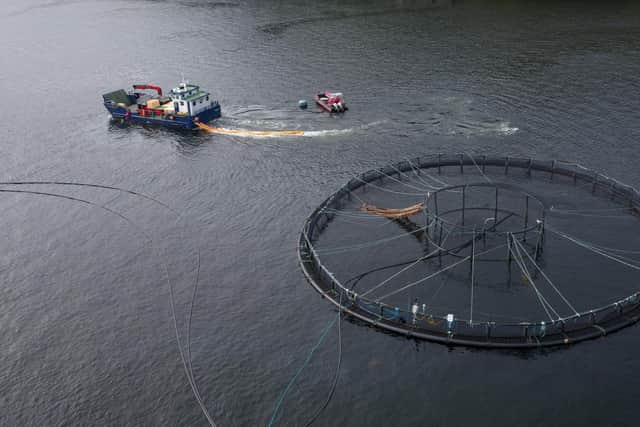Climate change: Warm seas and jellyfish blamed for record August farmed salmon deaths and harvest drop
Monthly mortality data produced by industry body Salmon Scotland show 3.61 per cent of farmed fish died before harvest in August.
This compares to an August death rate of 2.46 per cent in 2022, 1.99 per cent in 2021 and 2.64 per cent in 2020.
Advertisement
Hide AdAdvertisement
Hide AdJellyfish, parasites and diseases were the key killers this year, according to the data, with the impacts of climate change considered a major factor.
Sea temperatures have been particularly warm in Scotland this year, with an official ‘marine heatwave’ declared in early summer. Warmer waters can bring increased numbers of jellyfish, which can block or sting fish gills, and boost survival of bacteria and viruses.
According to Salmon Scotland, jellyfish and algal blooms have been exacerbated this year as a result of higher-than-average temperatures, but these are not expected to last.
The figures come on the same day as Scottish Government industry statistics revealed annual production of farmed salmon and trout was down by 18 per cent last year.


A total of 169,194 tonnes of farmed fish was produced in 2022 – 36,199 tonnes less than in 2021, when a record 205,393 tonnes was harvested.
Dr Iain Berrill, head of technical for Salmon Scotland, said: “There is no question that 2023 has been a challenging year, but the ongoing hard work by our farmers has provided good conditions for their salmon, despite record-breaking seawater temperatures here in the UK and globally.
“However, while there is always a level of fallen stock in any farming operation, the numbers this year are not where any farmer would want them to be. It is utterly devastating to the farmers caring for those animals when any fish are lost.
“Our ability to address the environmental challenges facing our fish while they spend up to two years in the sea has improved, but there is always more we can do to further improve survival.”
Advertisement
Hide AdAdvertisement
Hide AdEnvironmental campaigners have said the fall in 2002’s harvest was “not surprising” after record-high losses of fish last year.
Rachel Mulrenan, Scotland director of campaign group Wild Fish, said: “The considerable drop in farmed salmon production volume is not surprising, considering that 2022 was the deadliest year on record for Scottish salmon farms, with 16.7 million farmed salmon dying in the water. What is concerning is that this year is looking even worse than last, with 10.5 million deaths already reported from January to August – 2.7 million more than the same period last year.
“High mortality on salmon farms reflects an environmental disaster, as well as being an animal welfare scandal.”
Fish farming is worth around £885 million to the Scottish economy. Ministers have set out ambitions to expand the industry, with a target to produce 300,000 to 400,000 tonnes annually by 2030.
Rural affairs, land reform and islands secretary Mairi Gougeon has welcomed the latest statistics, despite the drop in output.
“These figures also show that farmers are pro-actively responding to environmental and biological challenges and pressures, for example by making the responsible decision where necessary to harvest smaller fish to support health and welfare, which has resulted in decreased production figures,” she said.
Faroese fish farm firm Bakkafrost reported particularly high August losses at a number of its operations. Six sites were hit by massive monthly death rates from 19.6 per cent to 38.2 per cent.
At Druimyeon Bay, on the Isle of Gigha, more than four out of five fish died in a single production cycle, while Greanamul, on Benbecula, lost more than half of its stock.
Advertisement
Hide AdAdvertisement
Hide AdA spokesperson for Bakkafrost Scotland said: “Mass mortalities are not unique to fish farming and, like other farmers, we take pride in our stock and our facilities.
“We are experts in salmon husbandry and are committed to the welfare and health of our salmon and the natural environment, which are intrinsically linked. The warmer sea water temperatures over the summer resulted in increased environmental and biological challenges for salmon stock and our teams have worked diligently over the summer and have gone above and beyond to manage a challenging set of circumstances.
“Our world-class standard operating procedures and our critical situation deployment plan and investment in our facilities means that we are fully equipped to respond to urgent situations at speed.”
Activist Don Staniford, director of $camon $cotland, blasted the deaths, calling for an end to the industry.
“Scottish salmon is dead in the water, with 2023 shaping up to be the worst year ever,” he said. “A deadly cocktail of warming water temperatures, swarms of jellyfish, gill problems, infectious diseases, plagues of parasites and toxic algal blooms has already killed off millions of salmon this summer.
“The Scottish Government must end the welfare nightmare inside salmon cages by shutting down the 250 factory farms littering the Highlands and Islands of Scotland.”
Comments
Want to join the conversation? Please or to comment on this article.